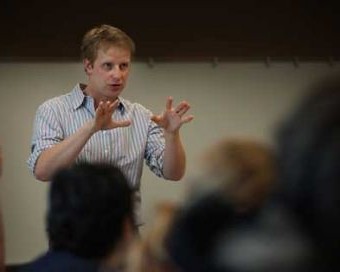
Social change advocates talk a lot about engaging conversation, about bringing people together.
And yet, attend just one parent-teacher or chamber of commerce meeting where a contentious issue is being addressed, and you’ll know it’s not that easy. Bringing together groups with different opinions may mean only that they have the opportunity to yell at each other more loudly.
That is where the Olive Tree Initiative began its journey. Watching pro-Israeli and pro-Palestinian students on the campus of the University of California at Irvine, a group of students decided to do something to create more meaningful dialogue than the shouting matches that often erupted.
The program that has emerged from those small beginnings is the topic of this interview with Olive Tree co-founder Daniel Wehrenfennig. As Daniel points out, it is not enough to just bring people together, especially if they come from deeply entrenched and opposing views. Regardless of the issue, creating a better future will require productive ways of talking with each other and learning from each other.
As you listen to the interview, some questions to ponder…
- What would it make possible for your own work, if everyone at every level had facilitation skills? What would meetings look like if the meeting chair had facilitation skills – actively facilitating conversation and decisions?
- If everyone from the receptionist to the CEO was skilled in listening and sharing and learning and reflecting – what would your work environment look like and feel like? What would your community look like and feel like? And what results might you be able to achieve in your community that you haven’t been able to achieve before?
- To what degree are you acting as a community convener? What opportunities might you have for bringing people together and facilitating conversation in a safe, neutral environment? If that became a key function of your work, what might that make possible for your mission in the community?
- What opportunities does your organization or enterprise provide for experiential learning? If one of the keys to your mission is advocacy, what might it make possible if you were able to provide a more experiential link between your organization’s issues and those you wish to influence? For example, if your work is focused on alleviating poverty, what might you be able to accomplish if you provided experiential learning opportunities for your group’s leadership, for your funders and investors, for your legislators, for your community overall?
We hope you will add your thoughts in the comments. What does it take to create the kinds of dialogue that allow community members to live well, individually and collectively?
Listen to the Audio Only:
or
![]() Download the MP3
Download the MP3
(To download to your hard drive, right-click {or click and hold on a Mac} on the link above and select “Save Target As”.. or “Save Link as”… depending on your browser)
